According to GCV Analytics, in November, the number of corporate-backed deals from around the world stood at 478, up 65% from the 290 rounds from the same month last year. Investment value stood at $28.22bn in total estimated capital – more than double the $12.42bn of November 2020. The US came first in the number of corporate-backed deals, hosting 210 rounds, while Japan was second with 48 and China third with 34.

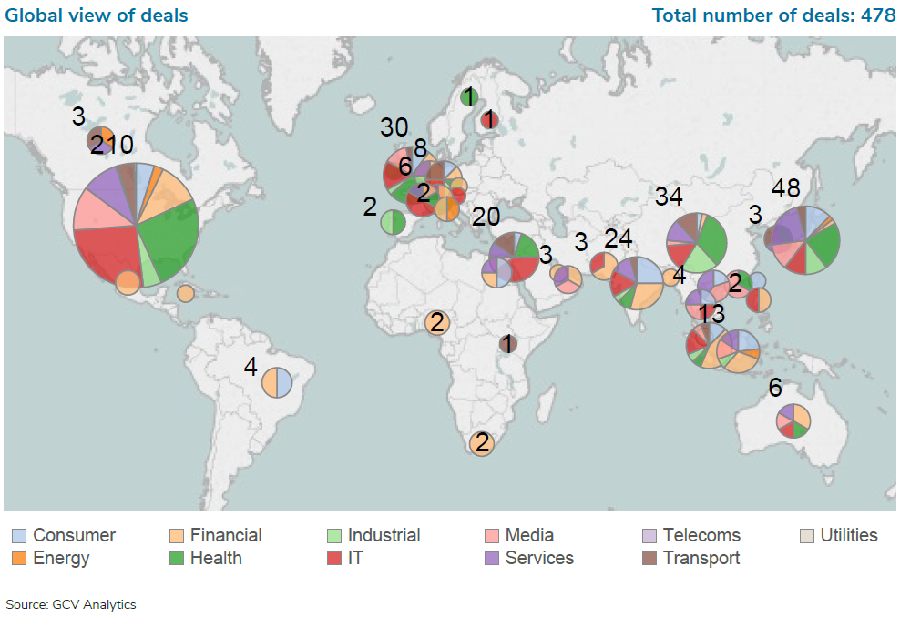
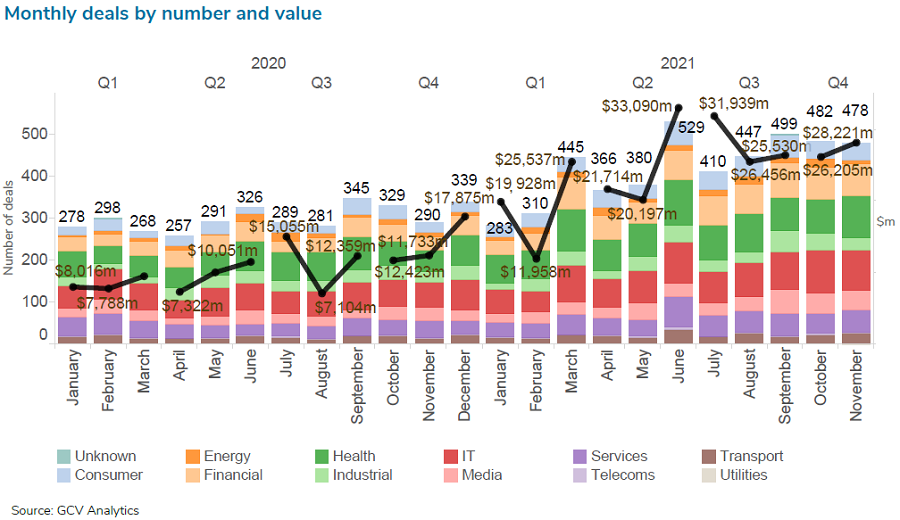

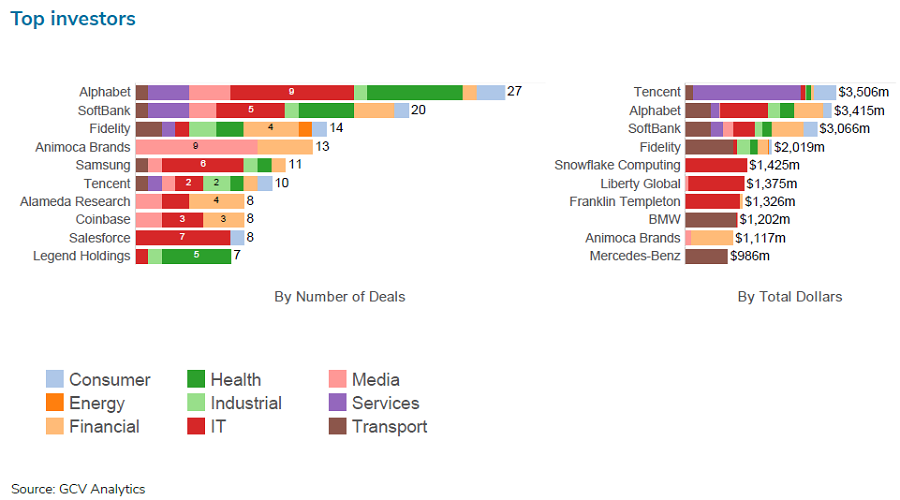
The leading corporate investors by number of deals were diversified internet conglomerate Alphabet, telecoms and internet conglomerate SoftBank, as well as investment and financial services group Fidelity. In terms of involvement in the largest deals, internet company Tencent was on the top of the list along with Alphabet and SoftBank.
GCV Analytics reported 26 corporate-backed funding initiatives, including VC funds, new venturing units, incubators, accelerators and other. This figure was 33% lower than the one from November 2020, which had registered 39 such initiatives. The estimated capital stood at $2.03bn, nearly 18% lower than the $2.46bn from the same month last year.
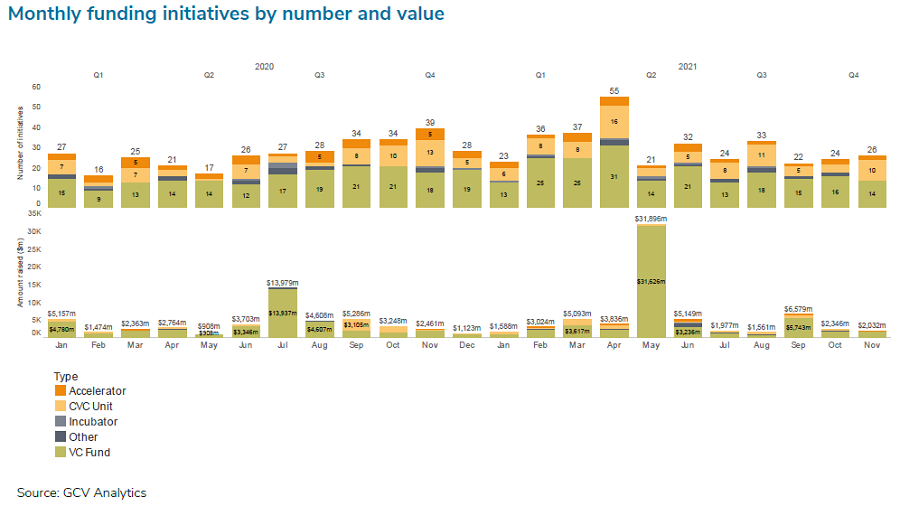
Deals
Emerging businesses from the health, IT, financial and services sectors led in raising the largest number of rounds in November 2021. The most active corporate venturers came from the financial, IT, health, media and services sectors, as shown on the heatmap on page 62.
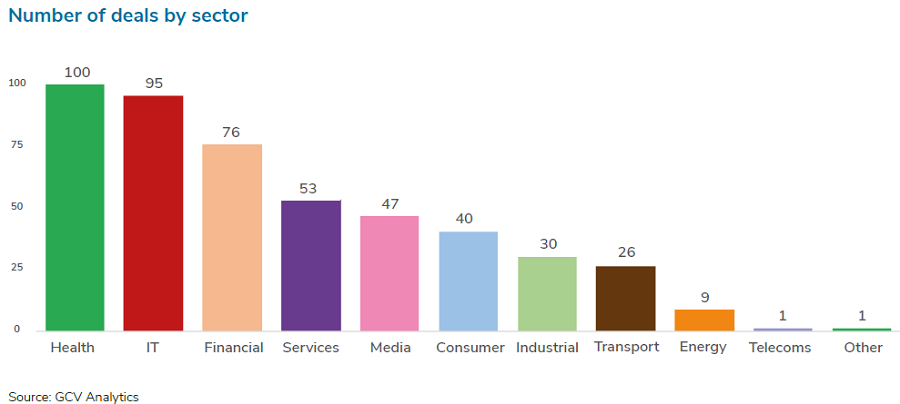
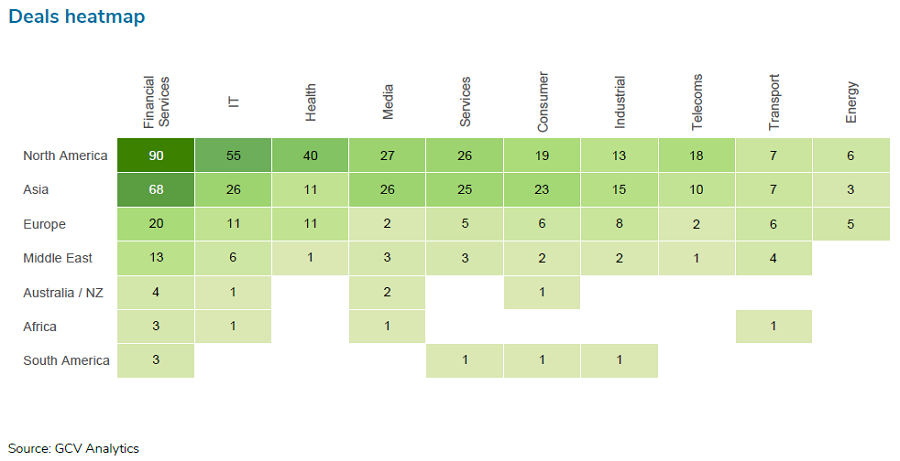

Indonesia-headquartered logistics provider J&T Express received $2.5bn in funding from investors including Tencent. The capital was raised at a $20bn valuation and the round is set to precede a planned initial public offering expected to take place in Hong Kong in early 2022. Boyu Capital, Hillhouse Capital and Sequoia Capital China also contributed to the round while SIG China, a subsidiary of quantitative trading firm Susquehanna International Group, reportedly participated as well. J&T operates an express delivery and warehousing business focused on the e-commerce space, which has boomed in Indonesia with the entry of domestic online platforms such as Tokopedia, Bukalapak and Sociolla in recent years. J&T operates in several Southeast Asian countries as well as China, and is planning expansion there as well as in Latin America.
US-headquartered cybersecurity software provider Lacework received $1.3bn in funding from investors including data software producer Snowflake and mass media group Liberty Global. The corporates participated in the round, which valued the company at $8.3bn, through subsidiaries Liberty Global Ventures and Snowflake Ventures. The company´s overall funding now stands at about $1.9bn. Sutter Hill Ventures, Altimeter Capital, D1 Capital Partners and Tiger Global Management co-led the round. Lacework has created a software platform which automates the collection, analysis and correlation of data to seek out crucial security events. The deal follows the company’s acquisition of data-focused cybersecurity platform developer Soluble and the capital will fund product development, hiring and international growth.
Ionity, the Germany-headquartered electric vehicle (EV) charging network set up by a range of automotive manufacturers, raised €700m ($786m) from its existing backers in addition to investment management firm BlackRock. Founded in 2017 by carmakers BMW, Ford Motor Company, Mercedes-Benz, Volkswagen Group, Audi, Porsche, Hyundai Motor Group and its Kia subsidiary, Ionity oversees a range of EV charging stations spanning highways in 24 countries, facilitating long-range travel. BlackRock took part in the round through its Global Renewable Power platform and the proceeds will be allocated to quadrupling the number of Ionity stations to some 7,000 by 2025 as the company looks to expand its presence to trunk roads and urban locations. The funding will also be channelled into expanding the company’s existing stations from four chargers to between six and 12.
US-based blockchain gaming technology developer Forte raised $750m in a series B round backed by multiple gaming and media corporates, taking its total funding about $935m in 2021 alone. Digital entertainment and blockchain technology developer Animoca Brands, record company Warner Music Group, gaming studios OverWolf, Playstudios and Huuuge Games and blockchain developers Cosmos, Polygon Studios and Solana all took part in the round, the last through its Solana Ventures vehicle. Private equity firm Sea Capital and Kora Management co-led the round, which also featured Andreessen Horowitz, Tiger Global Management and Griffin Gaming Partners. Founded in 2019, Forte provides blockchain technology which enables game developers to create internal economies for video games, a sector that is set to see a rise in monetisation potential as non-fungible tokens (NFTs) are further integrated.
Investors including SoftBank and Alphabet acquired $700m worth of shares in US-based cryptocurrency investment firm Digital Currency Group (DCG) through a secondary sale. The deal valued the company at more than $10bn and additionally included GIC Capital and Ribbit Capital. SoftBank reportedly led the secondary round through its Vision Fund 2 and Latin America Fund, while Alphabet was represented by its CapitalG unit. DCG provides funding to blockchain and digital currency technology developers in addition to access to its network and industry know-how. It has some 150 active portfolio companies based across 30 countries. The company had received an undisclosed amount of funding from investors including insurer New York Life and payment services group Mastercard soon after it was founded in 2015.
US-based autonomous vehicle developer Nuro raised $600m in series D funding from investors including internet technology provider Google, grocery chain Kroger and SoftBank’s Vision Fund 1. The round reportedly valued Nuro at $8.6bn. Tiger Global Management led the round, which also featured automotive manufacturer Toyota’s Woven Capital fund, Fidelity, Baillie Gifford, Gaorong Capital and funds and accounts advised by T Rowe Price. Nuro has developed autonomous electric vehicles used to deliver products such as groceries or medication. It will allocate the cash to technology development, hiring and expanding the commercial deployment of its technology.
US-based urban mobility service Lime raised $523m in convertible debt and term loan financing from investors including ride hailing service Uber. Uber, Fidelity, Abu Dhabi Growth Fund and Highbridge Capital Management provided $418m in convertible debt while UBS O’Connor supplied a $105m term loan. Founded in 2017, Lime provides electric scooter and bicycle rental services in 120 cities worldwide. It will use the capital to boost its growth and expand into more cities globally, while about $20m of the funding will be deployed to pursue innovations that will further decarbonise its supply chain.
China-based social commerce app developer Xiaohongshu raised $500m from investors including Tencent and e-commerce firm Alibaba. Singaporean government-owned investment firm Temasek also participated in the round together with venture capital firm Genesis Capital and investment management firm Tiantu Capital Management at a valuation of up to $20bn. Xiaohongshu operates an online platform that allows users to share images, videos and stories which can help to leverage online purchases and review consumer products and services.
Digital payment technology provider Mogo revealed it was among the investors in the $400m funding round disclosed by US-headquartered cryptocurrency trading and storage platform developer Gemini. The round was led by Morgan Creek Capital’s Morgan Creek Digital subsidiary at a $7.1bn valuation. It was backed by financial services firm Commonwealth Bank of Australia, 10T, ParaFi Capital, Newflow Partners and Marcy Venture Partners and represents the company’s first external funding. Founded in 2014, Gemini operates a digital platform which enables users to buy, sell and store digital currency and decentralised finance tokens. It works with some 60 cryptocurrencies and also allows users to earn and learn about cryptocurrency.
Asset management firm CoVenture led a $325m series A round for US-headquartered e-commerce aggregator Benitago Groupe that included financial services firm HSBC. Benitago is an aggregator and incubator for e-commerce brands, developing its own brands in-house in addition to buying and investing in existing online brands on marketplaces such as Amazon. The funding came eight months after a $55m seed round featuring CoVenture that consisted of equity and debt financing. The cash will support the company’s continual acquisition of Amazon brands and the growth of its brand offering along with its product development studio.
Exits
GCV Analytics tracked 57 exits involving corporate venturers as either acquirers or exiting investors in November. The transactions included 43 acquisitions, 13 initial public offerings (IPOs) and other transactions.
The exit count was considerably above the November 2020 figure (33). The total estimated exited capital stood at $29.62bn, nearly three times over the $10.64bn from same month from last year.
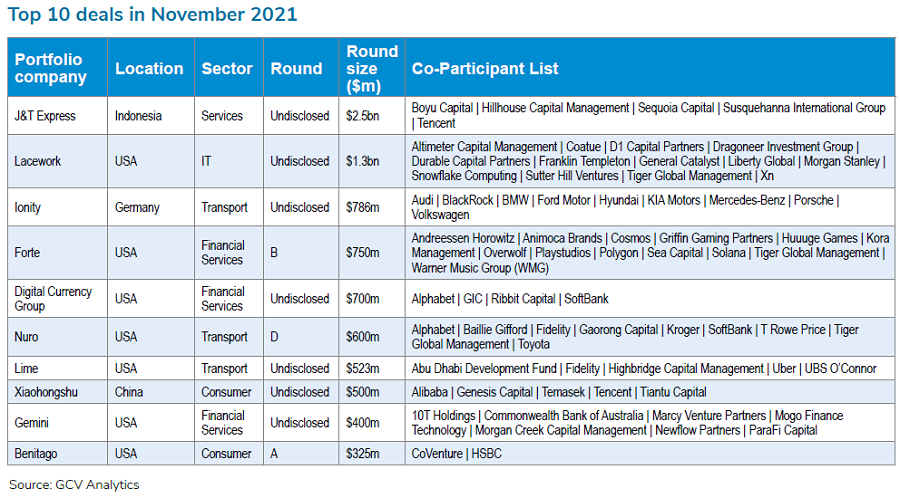
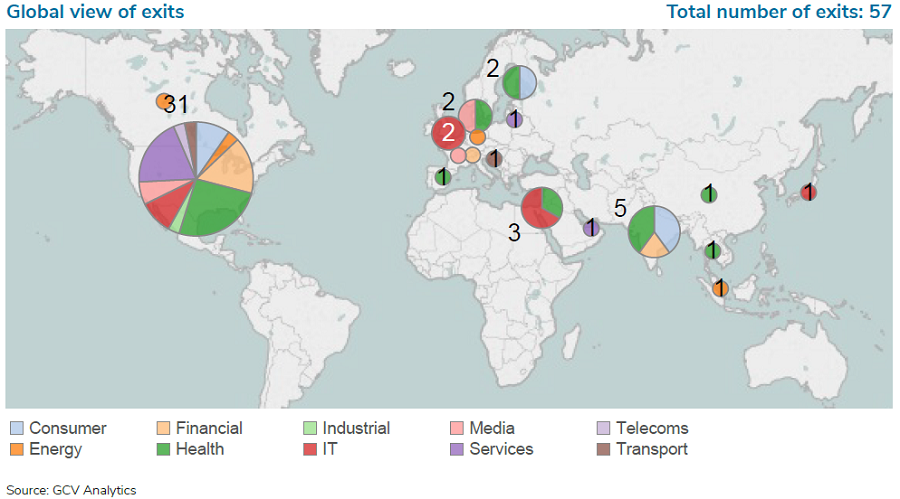
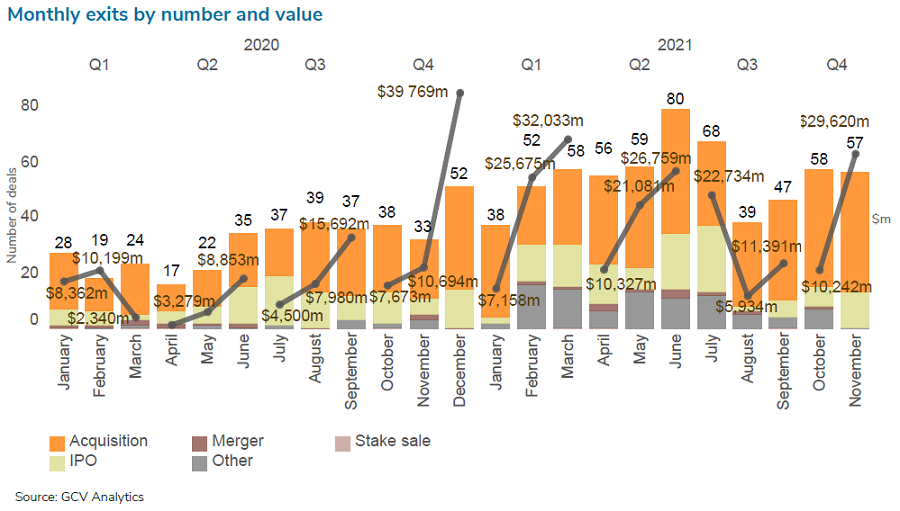
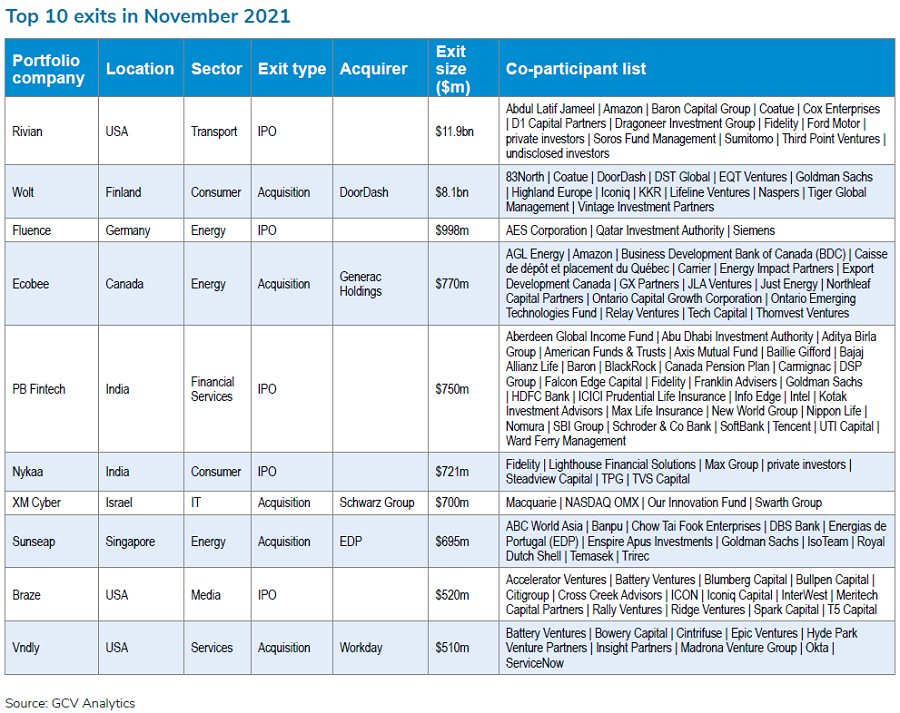
US-based electric jeep developer Rivian went public in an $11.9bn IPO, giving exits to corporates e-commerce firm Amazon, automaker Ford, conglomerates Cox Enterprises and Sumitomo as well as vehicle distributor Abdul Latif Jameel. The offering follows about $10.5bn in funding for the company since it was founded in 2009. The company increased the number of shares in the offering from 135 million to 153 million and priced them at $78.00 each, above the $72 to $74 range it had set. It floated on the Nasdaq Global Select Market and the price made it the largest IPO so far this year. Rivian began deliveries of its all-electric pickup truck, the R1T, in September this year and its sports utility vehicle, the R1S, is scheduled to follow suit in December. It is largely pre-revenue but generated a $994m net loss for the first six months of the year.
Online food ordering service DoorDash agreed to acquire Wolt, a Finland-based food and consumer delivery service that counts internet group Prosus as an investor, in a €7bn ($8.1bn) all-share deal. The transaction includes a retention pool sized at about €500m for Wolt’s 4,000 employees and its management team. The company had raised approximately $856m in funding before. Founded in 2014, Wolt operates an online platform which allows customers in 23 countries to order food, groceries and other consumer goods from local shops to be delivered to them at home. The purchase will allow DoorDash to expand its reach to a host of new markets.
Fluence, the Germany-headquartered energy storage technology producer co-founded by energy utility AES and industrial technology and appliance provider Siemens, closed its IPO at just over $998m. The company had initially raised an initial $868m in the offering, issuing 31 million shares priced at $28.00 each. Those shares have since risen to $35.32, leading the underwriters to buy another 4.65 million shares for a total of $130m. Formed by the corporates in 2018, Fluence produces modular battery-based storage systems for use with renewable energy installations such as solar plants or wind farms. Its IQ Digital Platform software meanwhile helps users get the best price for their energy through automatic bidding and price prediction tools.
Power generator manufacturer Generac Holdings agreed to acquire Ecobee, a Canada-based smart thermostat producer backed by corporates Amazon, temperature regulation technology supplier Carrier and energy providers AGL Energy and Just Energy, for up to $770m. Generac will pay $200m in cash along with $450m in common stock to the current equity holders of Ecobee. Its shareholders may receive up to $120m in additional Generac shares upon achievement of certain performance targets between the close of the deal and June 30, 2023. Founded in 2007, Ecobee has developed a smart thermostat equipped with voice control capabilities that can measure room temperature and detect how many people are in a room, as well as a wider suite of home monitoring products including smart sensors and cameras.
PB Fintech, the India-based, corporate-backed marketing and consulting group that owns insurance listings platform PolicyBazaar, floated in a Rs 56.3bn ($750m) IPO. Each share was priced at Rs 980 ($13.10). PB Fintech issued 26.2 million new shares, totalling $500m while existing shareholders including SoftBank and its Vision Fund (through SVF Python II) are divesting $250m. Founded in 2008, PB Fintech runs insurance policy comparison platform PolicyBazaar and PaisaBazaar, a similar tool focused on financial services products. The company received $343m in pre-IPO funding from 155 anchor investors including insurers ICICI Prudential, Nippon Life, Bajaj Allianz Life, HDFC Life, SBI Life and Max Life.
India-based FSN E-Commerce Ventures, the corporate-backed operator of fashion e-commerce platform Nykaa, floated having secured more than $721m in its IPO. Nykaa’s shares rose 89% to Rs 2,129 ($28.67) each on the BSE while those listed on the National Stock Exchange (NSE) reached Rs 2,018 ($27.17) apiece in the opening, representing a 79% rise from the issue price. The listing helped lift the company to a market capitalisation of about $13.5bn. Founded in 2012, Nykaa has built an online beauty, personal and pet care product marketplace that also offers its goods through more than 80 brick-and-mortar retail partners across India. It intends to use the IPO proceeds to increase its offline presence through new stores. Fidelity Management and Research paid an undisclosed amount for a stake in Nykaa through a secondary deal in November 2020.
Retail group Schwarz Group agreed to acquire Israel-based cybersecurity technology provider XM Cyber in a deal sized at $700m, allowing stock exchange operator Nasdaq and IT services provider UST Global to exit. Founded in 2016, XM has developed an automated software platform that helps organisations to head off cyber attacks and proactively stop them by finding attack paths and closing them off before they compromise IT infrastructure. The company will continue to operate independently following the acquisition and will support Schwarz’s recently formed cloud software platform.
Energy utility EDP agreed to acquire an 87.4% stake in Sunseap, a Singapore-headquartered solar power provider backed by energy company Shell, IsoTeam, conglomerate Chow Tai Fook Enterprises and energy utility maintenance provider Banpu, for €600m ($695m). The transaction is being conducted by EDP’s renewable energy subsidiary, EDP Renováveis (EDPR), and will give it an expanded presence in the Asia Pacific region as well as the option to increase its stake to 91.4% before the deal closes. Sunseap operates a network of solar power plants across Singapore, China, Japan, Malaysia, Indonesia, Thailand, Cambodia, Vietnam and Taiwan. It has a 540 MW portfolio of projects which have been completed or which are being built, and a pipeline totalling nearly 5 GW.
US-based customer engagement technology provider Braze floated on the Nasdaq Global Select Market in a $520m IPO representing an exit for financial services firm Citi. The offering involved the company issuing 6.7 million shares priced at $65.00 each, above the $55 to $60 range it had set previously. Venture capital firm Interwest Partners divested a further 1.3 million shares to raise $84.5m and the price values Braze at nearly $5.9bn. Braze’s software allows businesses to generate and process customer data in real time in order to strengthen the contextual relevance of cross-channel marketing and support wider customer engagement activities. The company increased its revenue 53% year on year to approximately $104m for the six months ending July 2021, though its net loss more than doubled from $12.4m to $25.8m over the same period.
Enterprise software provider Workday agreed to acquire Vndly, a US-based provider of human resources management software, marking exits for enterprise software producer ServiceNow and identity management software provider Okta. The companies did not disclose the transaction price but it was reported as $510m.Vndly has developed a platform to help companies manage their external workforce personnel. It will be integrated with Workday’s product offering, with the aim of providing customers with a comprehensive view of their workforce.
Note: Monthly data can fluctuate as additional data are reported after each issue of GCV magazine goes to press.